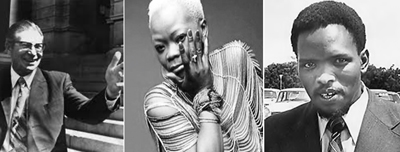Latest News Archive
Please select Category, Year, and then Month to display items
01 October 2019
|
Story Prof Francis Petersen
|
Photo Pixabay

During October, the national focus is on mental health. Mental Health Awareness Month also coincides with a time when our students prepare for the end of the year exams, making it a particularly valuable time for us to think about how we can continuously assist them during their time at university. The value of peer support and genuine care can never be overstressed; that is why I want to encourage our students to reach out to their support networks such as our Department of Student Counselling and Development, as we move towards the end of the year.
Mental health is an equally important matter for our staff. During this month, I want to encourage our staff to also take cognisance of their own well-being. There is a lot of wisdom in the old adage: Healthy body, healthy mind. Many of the initiatives of our Division of Organisational Development and Employee Wellness are focused on the value of physical activity and the negative impact that inactivity can have on one’s productivity and mental health. They also present regular lunch-hour sessions for our staff, where experts share information and practical tips for mental wellness. I want to encourage our staff to attend these sessions and to make use of the services the university has to offer in this regard. It is important to note that suffering from mental and anxiety disorders is not weaknesses and it is not always indicative of a deeper psychological issue; it is an illness and hence can be treated.
On 20 September 2019, a 21-member team was sent off on their run of 1 075 km to Stellenbosch to raise awareness for mental health. The run was organised by the Division of Organisational Development and Employee Wellness and the Faculty of Health Sciences. The team ran in relay format throughout the night and handed the baton of hope to Stellenbosch University on 25 September 2019. I admire and thank them not only for their commitment and stamina, but also for addressing this crucial matter in the public domain and for raising awareness in the many towns and communities along the way.
This is an excerpt from a message by Prof Francis Petersen.

Understanding the nature of prominence
2014-03-14
|
 |
What did Hendrik Verwoerd and Steve Biko have in common? Or perhaps Johannes Kerkorrel and Brenda Fassie?
“They all possessed a certain natural predisposition to prominence,” says Prof Paul Fouche, reseacher in psychobiography at the University of the Free State’s Department of Psychology.
Prof Fouche and a team of researchers from other South African universities released findings on psychobiographical studies done on personalities that played a great role in our history.
The studies show that notable historical figures were very often prolific readers with a passion for literature since childhood. Generally, they also had a great love for nature and a sense of the sacredness of it, as well as a love for the cosmos.
The study further reveals that many of them were forced to take up leadership roles in the family from a very young age and were driven to succeed in order to take care of their own.
In many of these cases, there was a strong partner who supported the leader while they went about the business of governing their world.
Psychobiography is the systematic and descriptively-rich case study of renowned, enigmatic or even contentious individuals in socio-historical contexts within a psychological frame of reference. Over the past decade, psychobiography has become an established research genre and a methodology used by various academics and scholars in the field of life history research.